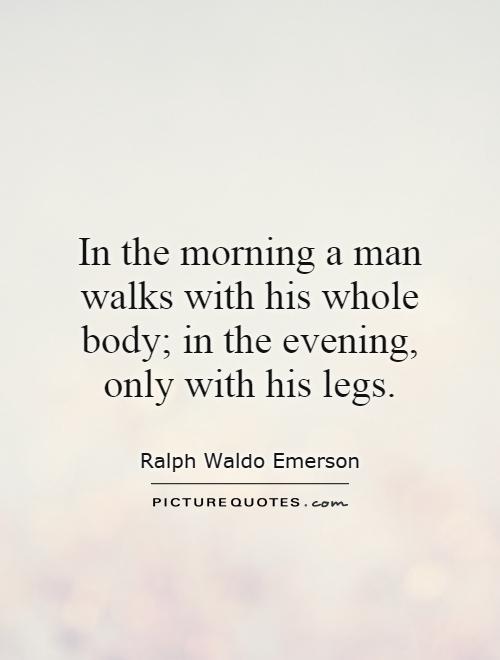In the morning a man walks with his whole body; in the evening, only with his legs

In the morning a man walks with his whole body; in the evening, only with his legs
Ralph Waldo Emerson, a renowned American essayist, lecturer, and poet, was known for his profound insights into human nature and the interconnectedness of the individual with the natural world. One of his most famous quotes, "In the morning a man walks with his whole body; in the evening, only with his legs," encapsulates his belief in the importance of living in the present moment and being fully engaged with one's surroundings.Emerson believed that the morning symbolized a time of renewal and possibility, where one's senses are heightened and their awareness is at its peak. When a man walks in the morning, he does so with his whole body, meaning that he is fully present and engaged in the act of walking. He is attuned to the sights, sounds, and sensations around him, and he moves with a sense of purpose and vitality.
On the other hand, the evening represents a time of reflection and winding down. As the day comes to a close, a man may find himself walking with only his legs, going through the motions without the same level of awareness and intentionality as in the morning. Emerson suggests that in the evening, we may become more passive and detached, simply going through the motions without truly experiencing the world around us.
Emerson's quote serves as a reminder to live each moment fully and consciously, to be present in our bodies and minds, and to engage with the world around us with a sense of wonder and curiosity. By walking with our whole bodies, we can experience the richness and beauty of life in all its forms, and truly appreciate the interconnectedness of all things.












 Friendship Quotes
Friendship Quotes Love Quotes
Love Quotes Life Quotes
Life Quotes Funny Quotes
Funny Quotes Motivational Quotes
Motivational Quotes Inspirational Quotes
Inspirational Quotes